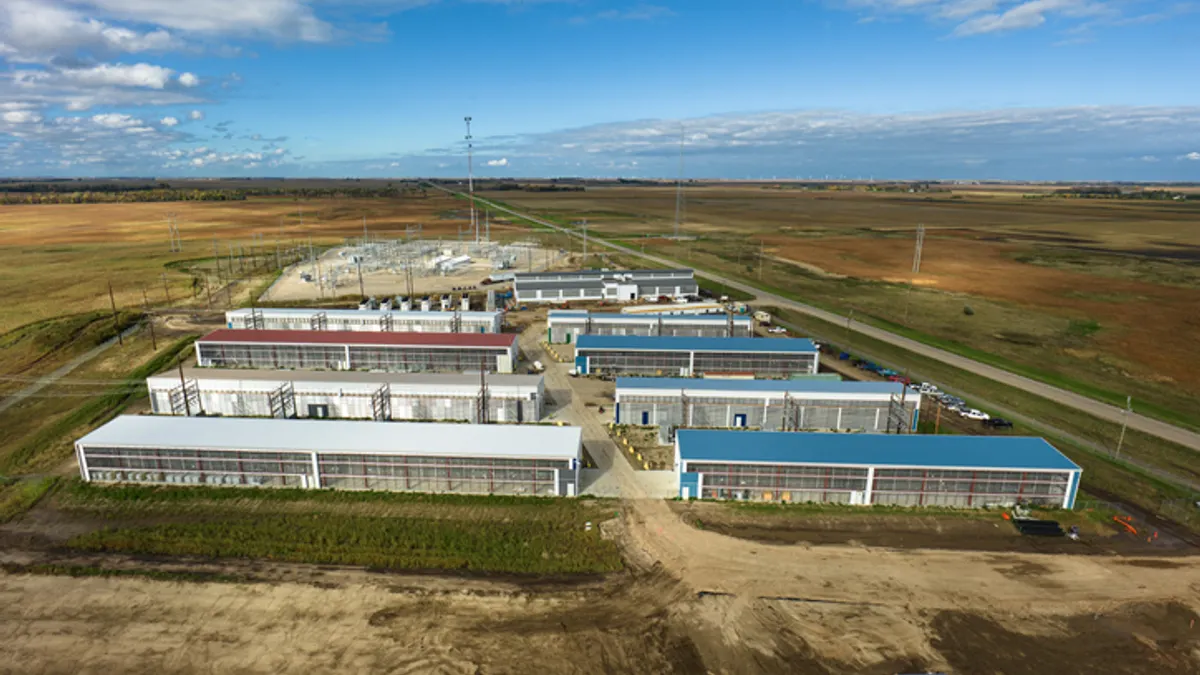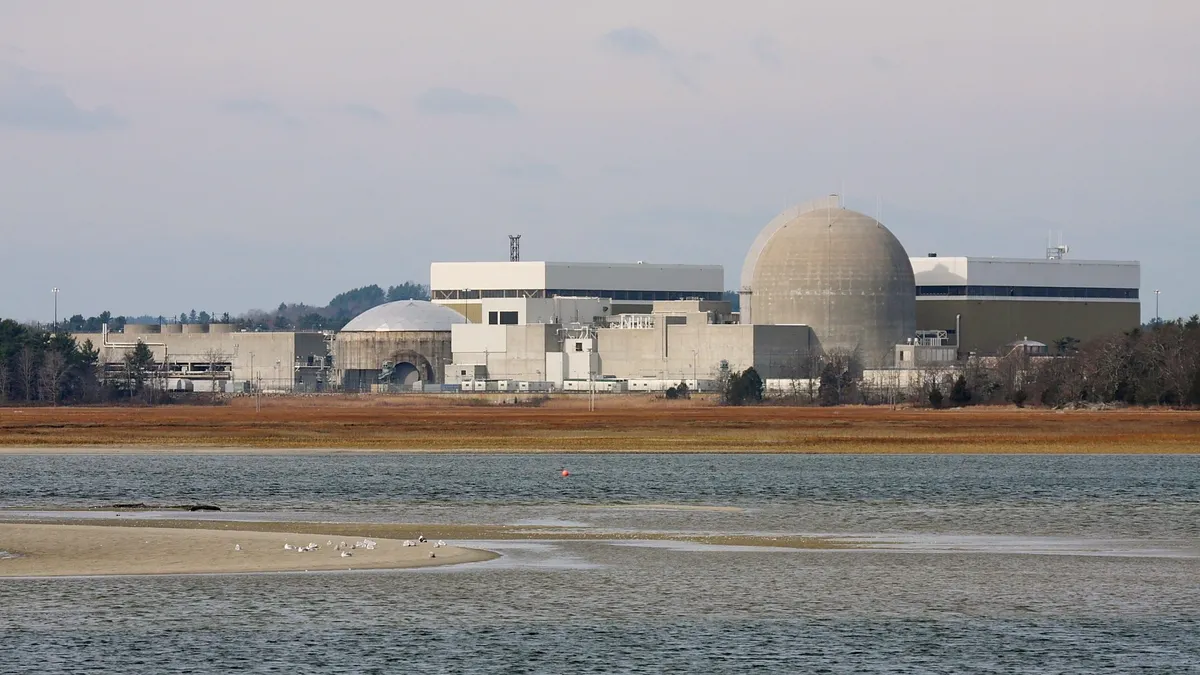M&A deals don’t usually live or die on legislative action, but Dominion’s $14.6 billion offer to acquire SCANA is not an ordinary deal.
It is not just a merger; the deal could also resolve the thorny issue of SCANA’s liability for the failed V.C. Summer nuclear project. It is an issue that comes with a heavy helping of political risk.
Analysts are divided on whether the deal will survive in its current form, with some saying it's probable and others saying it's unlikely.
Summer abandonment = irate lawmakers
After SCANA and its partner on the project, state-owned Santee Cooper, abandoned the nuclear project in July, irate lawmakers called for a special investigation. Their ire was all the sharper because the project was made possible by a law sponsored and passed by some of the same lawmakers now looking for blood.
The 2007 Baseload Review Act cleared a path for South Carolina utilities to take on the massively expensive nuclear project by allowing SCANA to recover financing costs during construction of the project and guaranteeing rate recovery of the project’s capital costs.
South Carolina’s legislature, which returned from its Christmas break on Tuesday, has reconvened a special legislative committee investigating SCANA’s failed $9 billion nuclear project. If the legislature decides to rescind the Baseload Review Act, it could scuttle the proposed acquisition.
“SCANA does not have any other options, and regulators will be aware of that, so the deal is likely to go through, but it will be noisy.”

Shahriar Pourreza
Analyst, Guggenheim Securities
Legislators are “tapping the brakes pretty hard,” on anything having to do with SCANA, Blan Holman, an attorney with the Southern Environmental Law Center, told Utility Dive.
The political risk inherent in the deal was one of the first questions analysts asked on a Jan. 3 Dominion conference call to discuss the deal.
Dominion CEO Thomas Farrell said he had met with key political players, had “lengthy and fulsome” discussions with them and was “pleased with where things stand right now.”
Farrell also told analysts that there were significant regulatory and legislative protections built into the deal and that any changes that have an “adverse economic impact on the financials” would end the agreement.
The only deal in town
Dominion may be counting on the fact that its offer is “the only deal in town,” as Robert Shapiro, a partner with Norton Rose Fulbright, told Utility Dive. There are constitutional issues that could make it difficult for the legislature to retroactively revoke the guarantees in the law, Shapiro said.
Dominion’s take-it-or-leave-it approach could win the day. “SCANA does not have any other options, and regulators will be aware of that, so the deal is likely to go through, but it will be noisy,” Shahriar Pourreza, an analyst with Guggenheim Securities, told Reuters
Other companies, including NextEra Energy and Duke Energy, have been mentioned as potential acquirers of SCANA, but the $1,000 check Dominion is offering SCANA ratepayers is “so big in an election year that this should seal the deal for Dominion,” Angie Storozynski, a managing director with Macquarie Capital (USA), told Utility Dive via email.
Storozynski also noted that the strength of Dominion’s stock price puts it in a position to make a better offer than competitors like Duke or NextEra, in a deal where stock would be used as currency.
But not all analysts are as sanguine. In a note to investors, analyst Julien Dumoulin-Smith, with Bank of America Merrill Lynch, welcomed the strategic aspects of the combination and the potential for a 2% increase to Dominion’s earnings, but he gave the deal even odds of closing.
Even though Dominion’s management is “fully capable of navigating politically constrained jurisdictions,” Dumoulin-Smith noted that the situation in South Carolina is “extremely difficult to assess.”
Others are more pessimistic.
“We don’t think the South Carolina legislature will support the deal as currently offered by Dominion,” Timothy Fox, a vice president at Clearview Energy Partners, told Utility Dive via email.
And, in a detailed analysis last week, analysts Hugh Wynne and Eric Selmon at investment research firm SSR LLC said they think the deal will not close because ratepayers could do much better.
There may not be a better offer from another suitor, but Wynne told Utility Dive that ratepayers would be far better off with a securitization deal than with the Dominion acquisition.
Securitization better for ratepayers
Securitization is a financial instrument that pools a stream of payments, such as mortgage or credit card payments, and packages or “securitizes” them into bonds that can be sold to investors.
Wynne says SCANA’s electricity revenues could be used as collateral for a 20-year bond placed in the capital markets. The funds raised would then be used to recover SCANA’s $3.5 billion cost of the failed nuclear project. Assuming an interest rate of 3.5%, Wynne estimates the bonds would require an annual allocation of $245 million of SCANA customer revenues.
By contrast, in Dominion’s deal, Wynne estimates Dominion could require about $400 million annually to recover the nuclear costs. Securitization has a lower interest rate, so it would require a lower income stream.
Wynne also points out that when the effect of the new, lower corporate tax rate is taken into account, the concessions that Dominion is offering SCANA ratepayers are not as attractive as they might first appear.
Dominion is offering to pay SCANA ratepayers $1.3 billion in cash, which comes to about $1,000 per customer. But, as Wynne notes, absent Dominion’s offer, South Carolina regulators would require SCANA to reduce the costs they can recover from ratepayers by the amount of money they would save under the lower corporate tax rate of the just passed tax cut bill. (Tax is a cost that utilities pass on to ratepayers.) That would reduce the amount that SCANA could collect from ratepayers to $2.2 billion from $3.5 billion.
Under Dominion’s proposal, ratepayers would get an upfront payment of $1.3 billion, but still have to pay off the full $3.5 billion. Dominion would keep the tax benefit under its structure for the deal. In effect, says Wynne, the upfront payment is “a loan to ratepayers to be recovered over 20 years in higher electricity rates and carrying an effective interest rate of 9.7%.” (The interest rate is based on SCANA’s allowed return on ratebase, which includes an estimated weighted average pre-tax cost of capital of about 9.7%.)
Similarly, Wynne notes that the $1.7 billion write-down of Summer costs that Dominion is proposing would happen with or without the acquisition deal. He argues that it is “highly uncertain” that regulators would allow recovery of those costs, “given the evidence that SCANA may have incurred these costs imprudently, having continued construction despite the knowledge that the project could not be completed at the budgeted cost, and that SCANA may have misled its regulators by withholding this information.”
Signs of trouble
The South Carolina legislature is investigating reports that SCANA may have known the project was in trouble long before its final decision to abandon it. A Bechtel report has raised questions along those lines. In addition, the Securities and Exchange Commission subpoenaed SCANA as part of an investigation of the failed project.
"It is a sweet deal for Dominion, but, penny for penny, it is what ratepayers would get anyway ... Dominion’s deal is essentially a sham and a scam.”

Mark Cooper
Vermont Law School
Dominion is also offering a 5% rate cut for SCANA customers. Wynne’s analysis of that is more complex, but in essence he says the cut “potentially represents real savings” of $60 million “to customers that they otherwise would not have enjoyed.”
So, while ratepayers would get something out of the Dominion deal, Wynne says SCANA shareholders would do even better because they would be able to recover the full $3.5 billion in costs associated with the failed nuclear plant.
Whether that goes over with regulators and legislators remains to be seen. Wynne points out, however, that securitization would solve another problem that Dominion’s offer does not address.
In the wake of Dominion’s offer, South Carolina Gov. Henry McMaster (R) said the deal represents “progress,” but fails to provide relief for Santee Cooper ratepayers.and leaves 700,000 electric cooperative customers on the hook to pay for the failed nuclear project.
Wynne says a securitization could be structured to include a low cost way to recover Santee Cooper’s 45% share of the project, as well as SCANA’s 55% share.
There has not been much talk about securitizing the Summer liability. Back in August, one analyst gave it a 10% chance of happening. It's not clear if the possibility is being considered, but it could become part of the conversation. The SSR report, and its discussion of securitization, is circulating in the legislature. Shane Massey (R), the majority leader of the South Carolina Senate on Jan. 5 tweeted out a quote from the report.
Deal alternative
Another alternative to the Dominion deal would be to allow SCANA to declare bankruptcy. “Dominion is buying a distressed property,” Mark Cooper, senior research fellow for economic analysis at the Institute for Energy and the Environment at Vermont Law School, who has been a long time critic of the Summer nuclear project, told Utility Dive.
“A nuclear plant is like a cancer, but an operable cancer,” Cooper said. “If you cut it out, the body is just fine. Without the nuclear assets, SCANA would be just fine, and the assets would be scooped up by some buyer.”
Cooper agrees with Shapiro that the South Carolina legislature would run into legal and constitution problems if it tried to revoke guarantees written into the Baseload Review Act. “It would be a ‘taking,’” which is unconstitutional, he said, but legislation could succeed if it were based on imprudent behavior on SCANA’s part because a prudency standard is written into the law.
Cooper, like Wynne, says a close look at the deal shows multiple flaws. “It is a sweet deal for Dominion, but, penny for penny, it is what ratepayers would get anyway,” he said. “Dominion’s deal is essentially a sham and a scam.”




















